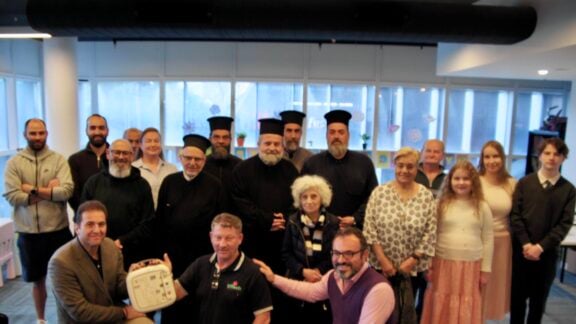On Christmas Eve 2024, a presidential degree of the President of Greece, published on 14 January this year, brought into effect a series of laws around appointing 6 April, as the day upon which “Remembrance days events for the Day of Thracian Hellenism are to be organised.”
It is unclear what exactly that means. When one reads on, one learns from Article 1 of the abovementioned decree that: “The 6th of April of each year is appointed as the Day of Thracian Hellenism.” We also learn that: “Remembrance events will have a pan-national character and will be held throughout the country.” Just how a day that specifically invokes Thrace will have a “pan-national character” is not explained. What is made clear however is that such events that will take place, are restricted solely within the boundaries of the Greek state. They thus do not apply to our communities in the diaspora.
Up until now, the presidential decree is quite silent on what exactly it is that Greek citizens are supposed to be remembering on April 6th. However, article 2 by contrast, sets out in detail just how the unnamed events we have no idea we are remembering, should be remembered. “The commemorative events to which representatives of Thracian organisations and bodies, include a general decoration with flags and illumination of public buildings, the holding of doxologies, the making of speeches, and the laying of wreaths in regional electoral seats.”
If you want to do anything else, you need not apply, save that the decree goes on, almost by way of afterthought, to concede that “In the framework of the abovementioned events, conferences and events by cultural groups within Thrace or the rest of Greece may be held, along with talks in schools at all levels.”
If Greek legislation applied to Greek cultural groups within Australia, imagine the ferment of excitement at these news. Imagine the disputes as to who would co-ordinate the events, which buildings would be festooned with flags, which would be illuminated, which ideologically sound speakers would be invited to give an address and of course, which Dance Groups would be invited to participate, and which would be excluded.
The good people at the Hellenic Parliament have already foreseen the fracas and have acted to nip it in the bud. Consequently, Article 3 of the decree prescribes that “the programme of events will be determined by the relevant regional administrator.” No room for discussion here.
For a long time, 6 April has been commemorated as a day marking the genocide of the Greeks that took place in the region of Thrace. Strangely, the word “genocide” is not mentioned at all in the Presidential Decree, nor is any other terminology employed that would shed light on the significance of April 6th. We can only speculate why this would be the case. However, making mention of what exactly is to be commemorated or remembered is important for two main reasons: Firstly, how can we expect to take seriously an afford due solemnity to an event that the Greek Stare either neglects or fears to name? Is not the refusal and/or omission to clearly describe such an event tantamount to an insult to the memories of those who [insert description here if you dare] – that is, if it is the suffering of the Thracians that we are supposed to be remembering?

Secondly, delineating the precise nature of the event to be commemorated is important because it provides valuable context by which we can evaluate the extent to which the prescribed forms of commemoration are appropriate. For example, if it is the Genocide we are remembering, then arguably, a doxology within a church is completely inappropriate, given that doxologies are thanksgiving services generally performed in order to celebrate felicitous events, such as the liberation of regions of Greece. National calamities, on the other hand, are times for reflection and for mourning where memorial services, mnymosyna, are much more fitting. During such times, it is also more fitting that rather than bedecking public buildings with flags, as if celebrating a national holiday, that such flags as are flown, are done so at half-mast. But then again, I am not the relevant regional administrator and have absolutely no say in the matter whatsoever.
There are of course three days within the Greek calendar that ostensibly commemorate the Genocide: 6 April in relation to the Greeks of Thrace, 19th May in relation to the Greeks of Pontus and 14 September in relation to the Holocaust of Smyrna. In contrast, the Armenians, who lived throughout the length and breadth of the Ottoman Empire have only one commemoration date that covers the entire bloody two decades within which the Genocide took place: the 24th of April. There is no genocide day of Van, genocide day of Harput, of Sivas or of Zeytun. Instead, the Genocide is labelled Armenian, and it is considered as something relevant to all Armenians, not just those who come from or are descended from those who come from the areas in which it was perpetrated.
Similarly, the Assyrians, a people who were traditionally spread over a large geographic area covering modern day Turkey, Iraq, Syria and Iran, and who are split into different linguistic groups and Christian denominations, have only one unified date to remember the many bouts of genocide visited upon their people, as recently as a few years ago: August 7th. They don’t refer to the Syriac genocide, the Aramean Genocide or the Chaldean genocide. Instead, it is a unifying event that is supposed to serve as a rallying point for an entire nation that is still yet to achieve emancipation.
Evidently, the same cannot be said about the Greeks. In Australia, and in many other countries in the world where the genocide has been recognised, it has taken years of painstaking work to explain that there was only ever one Genocide, perpetrated in different areas at different times, and that this Genocide was directed at Greeks as a whole, there being no differentiation of or understanding of regional identities. Through such grass-roots campaigning, the various victim communities have also come to the realisation that one genocide cannot be separated from the others, that the root causes, motivations and modus operandi of the perpetrators were the same, which is why the three victim communities nowadays reference the “Armenian, Assyrian and Greek Genocides,” to officials and all other interested parties.
Despite the practice as it relates to discussing the event with the broader community, unlike the other two victim communities, within ours in Australia, the Genocide does not always act as a unifying event. Instead, it is met with general indifference by the broader community, punctuated only by the perfunctory appearance of a few representatives of community organisations at yet another interminable wreath laying event organised by the Pontians, whose preserve the commemoration is widely held to be. In this delineated space, “ownership” of the Genocide reverts by default and through no fault of their own, to the Pontians, and it is known as the Pontian Genocide, or the “Genocide of the Greeks of Pontus,” no doubt to distinguish it from the Genocide of the Armenians in exactly the same area. The events of Thrace or the rest of Asia Minor, have in years past, barely rated a mention, for in a fragmented community such as ours, it is expected that each regional group will look after its own interests, and that no other group should abrogate to themselves that privilege. Despite this, the impetus to refer to the Genocide as “Greek” rather than as “Pontian,” “Thracian,” or “Asia Minor,” comes from the Pontian community itself, and the Pontian community has in recent years commemorated as belonging to the same overarching crime, the harrowing events that took place both in Thrace and Asia Minor, exemplifying just how complicated identity politics of this nature can be among a people who apart from conceding that their common ancestors are Pericles, Alexander the Great and Kolokotronis, seem bent only on emphasising what divides them, rather than what unites them.
The events surrounding the Genocide as it played out in Thrace are not well known and if the official recognition of the 6th of April as a day of remembrance will assist in promoting increased knowledge of that sad chapter in our history, then this comes as a welcome development. However, this development is much diminished if those establishing the day of remembrance have not the perspicacity or courage to name the event they expect the Greek people to commemorate. The whole cause of Genocide recognition is also diminished if the official appointment of three separate dates to recognise a single overarching crime leads to fragmentation, insularity and an inability of the disparate tribes that coalesce around the commemoration of each date to understand how they interrelate. Let us hope this is not the case.








